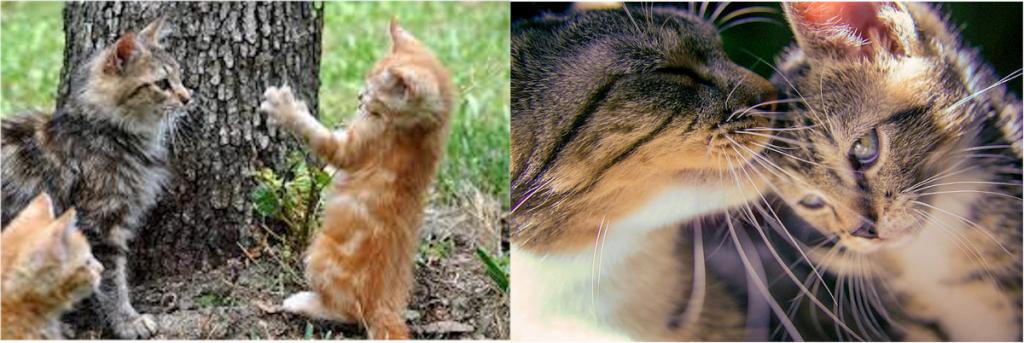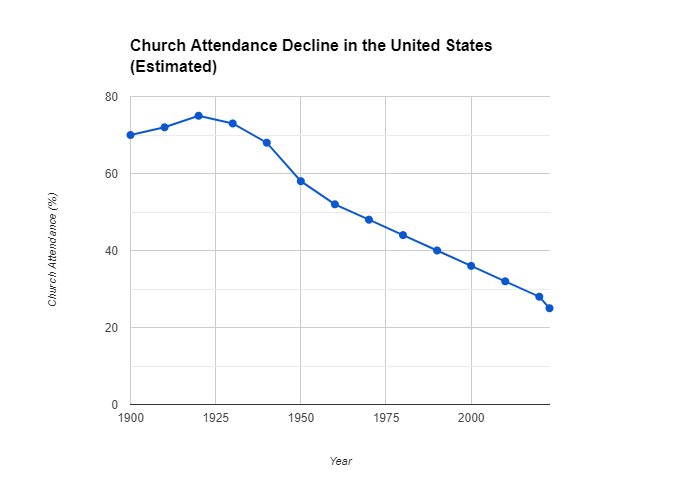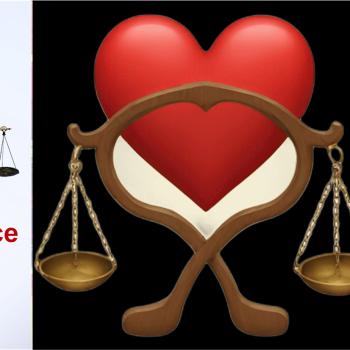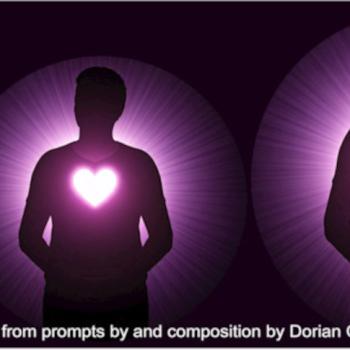What determines what we become? We become what we think and do. If our thinking aspires to higher goals, we become that. If our thinking focuses on rolling in the gutter, that’s what we become. Our experience is the feedback that cements our thinking into who we become, and comparison tells us to change. Through spiritual growth we become children of God or children of evil.

Spiritual Growth series
Reference verse:
“But the fruit of the Spirit is love, joy, peace, patience, kindness, goodness, faithfulness, gentleness, self-control; against such things there is no law.” – Galatians 5:22-23 (NASB)
Our interactions with others profoundly shape our self-perception. The world is a harsh reality, unforgiving to those who don’t conform, and sometimes a meat grinder. We learn how to behave through the experiences of both giving and receiving treatment.
It isn’t just self-preservation that compels us spiritually. It’s not just avoiding pain and finding pleasure. It’s altruism. It’s doing things for others because they have needs, but expecting nothing in return.
Do morals develop, or are they given to us?
Psychologist Lawrence Kohlberg theorized that moral development and religious development are interconnected, maturing alongside cognitive growth. This development typically peaks in our late twenties, when most of us have fully formed moral values. Prior to this stage, we may lack the life experience to fully grasp the consequences of our actions, a crucial factor in moral understanding.
As children get closer to adult age, they analyze the morals their parents, peers, and church give to them, and then develop their own morals. This is linked to our having enough life experience to appreciate consequences.
We have a couple of new kittens. They play fight endlessly. As they get stronger, they hurt each other. We hear little expressions of pain. The kitten causing the pain knows what it feels like from its experience and becomes gentler. We learn from life experience. Based on life experience, our empathy, sympathy, and compassion for others leads to growth. We understand pain and stop causing it. We understand fun and try to employ that.
We have difficulty seeing “The other” as human
Research indicates that our moral judgment is often influenced by proximity. We tend to be more empathetic toward those who are closer to us, focusing on the means by which change is achieved. Conversely, when dealing with distant concerns, we may prioritize the end goal over the methods employed. (See Soderberg, Callahan, Kochersberger, Amit, & Ledgerwood.)
What this means in practicality is if we want our neighbor to change, we might cordially ask them. If we want another country to change, especially one we don’t like, we might favor bombing them into submission. The Israeli-Palestinian war is an example. It’s easier to bomb than work out peace. It’s easier to use terrorism than to work out peace.
In their war, autonomy, and the right of return are lawful and essential, but not on the table. Until they there will be movements for the Israeli government’s destruction.
We have to ask ourselves if people in the Middle East will ever grow up and treat people like adults, or will they always hold a grudge and mistreat the other for their own gain. Where is the olive branch?
As we grow spiritually, we become more likely to consider all to be our neighbor and treat them that way.
Another practical example is the member of our country who believes differently than we do about sexuality, politics, race, gender roles, etc. We’re more likely to incite others to attack “the other” verbally or even physically. But when the attitude comes from a family member, we’re more likely to accept them rather than reject them.
How to develop a deeper faith through spiritual growth
In his work Stages of Faith, James Fowler examines the stages of moral development as interpreted by Piaget, Kohlberg, and Erikson. He introduces the concept of Conjunctive Faith, a perspective rooted in both Biblical and postmodern thought that emphasizes the value of “not knowing.” While we may not possess all the answers, we can navigate life effectively through faith and love.
In what the mystics call “detachment,” we can look at situations and see both sides. We have a firm grasp of our self-certainty and what is meaningful, and ability to find truth. Love might be that ultimate objective that reconciles.
We choose how to think about things in our lives, and how to react. Is a tit-for-tat relationship the best one, the most productive one, the one that produces the best end? Or should we be detached and carefully consider both sides before deciding how to react?
Kittens in a loving atmosphere continue to play fight into adulthood. Kittens in a hateful and conflict-ridden atmosphere become alley cats who view everything with suspicion and hate, and engage in nonstop fighting. People have a brain, faith, and love so that we can consider how to treat others.
Jesus said in Matthew 5:43-45, to love our enemies and be kind to those who persecute you. In this way we become children of our father in heaven. The choice is ours.
Shouting about becoming like Jesus from the rooftops
Keeping it real: People develop spiritually at their own pace. We can show them the ideal in Jesus and talk about it. We can talk about conforming to the image of Christ from the pulpit, from classes, and online, all we want. But until that person has the spiritual growth to accept the message, it means little to that person.
Fruits of the Spirit come with spiritual growth
The fruit of the Spirit is love, joy, peace, patience, kindness, goodness, faithfulness, gentleness, and self-control. These are things we learn like two kittens play fighting. We learn the effect of what we do on others. And we learn that when we emphasize these things, our and everyone’s life is better. We learn to practice these fruits so that we and others can get on with their lives.
Finding meaning and purpose: integrating experience and knowledge
The convergence of self-discovery with inward and outward moral growth helps us form meaning and purpose in our lives. Meaning and purpose have more influences that we won’t get into here. We often find this synthesis through meditation, contemplation, or even watching a movie. Serving others can also be a powerful catalyst for discovering our life’s purpose.
Next in the series: Transcendent spirituality
Conclusion
It’s to the benefit of those who gain from our division to spread propaganda that emphasizes our difference, from the news media to politicians to special interest groups. They’re using us. If people are trying to divide us, we need to be very skeptical of their motives.
Obviously, the news media emphasizes the dramatic for financial gain. The ugly gets viewers. Politicians do it to get power, influence, and money. When they do this, they don’t have the best interests of their constituents at heart, only their own. Like alley cats, suspicion and hate motivate them to fight to get what they want.
We’re all kittens (children) and always will be in God’s mature eyes. It’s up to us whether we become alley cats or children of God.
Probability Space
What probability spaces can we open in our minds to ask ourselves if we are alley cats or altruistic?
Potential Space
If we think creatively and allow our minds to wander and explore, how can we encourage the world to consider whether they are alley cats or altruistic?
Series links
Is Religion Spiritual or Stuck in Comfort?
The Life-Giving Power of Spiritual Development
Alley Cats to Angels: Spiritual Growth Transformative Power
Discerning Truth in a World of Spiritual Ideas
Can We Trust the Mystics and Prophets?
Hey! How can churches minister to new generations if they won’t come to church?
Our bucket has had a hole in it since 1925. We can’t find the plug!

I developed and presented a course on understanding and working with new generations. I would like to say I had rave reviews, but on a scale of 1 to 5 it averaged 4.5. Well, some of the people were raving.
The course helps people understand new generations, their values, and their differences. It helps people understand how to build a bridge to them and minister to them. The old worn-out things we used to do don’t work, and for good reason.
This solutions focused course enables people to find new ways, appropriate ways, to minister to these generations in their local circumstances. It’s for church groups and creates deep discussion.
Free video preview of the course:
_________________________________
My friend, David Ketcherside, former Christian broadcaster, has written a book series that I gave feedback on. It’s for men, written from his experience, thoughtful analysis, and heart. Gen A, Z, and X (Millennials) would find it very helpful. It’s available in print, on Kindle, and as an audiobook on Audible. Check out The Whole Dude. His description: “My hope is to remind readers what being whole looks like, and help them recognize the distortions that stop us from feeling totally awesome all the time.” He’s also excellent at marketing if you have marketing needs.
Delete: Key phrases: Spiritual Growth, Fruits of the Spirit, Self-Discovery, self-transformation, altruism, Moral Development, Stages of Faith, Conjunctive Faith
– Dorian
________________________________
Would love to hear your thoughts in the comments below. This helps me improve my work.
Please subscribe to my Patheos Newsletter.
_________________________________
Our answer is God. God’s answer is us. Together we make the world better.
Restore and recreate. Take time to celebrate life. Laugh, sing, and dance regularly, even every day. Happy. This is why we dance to celebrate life: Reindeer actually running and dancing.
Civic service opportunities
Do Unto Others Kindness Campaign, and civic engagement.
United Methodist Church Volunteer Opportunities.
Join or support Zero Hour and amplify the voices of youth organizing for climate action.
Peoples Hub. Resistance, Resilience, Restoration, Re-imagination. Online Popular Education. For movement workers to learn, connect, collaborate, and strategize – in and across the disability justice and solidarity economy movements.
Stakeholder Capitalism – a video podcast series from the World Economic Forum. Can capitalism be made to work for all of us – and to improve rather than destroy the state of the planet?
General service and aid opportunities (on One Spirit Resources Website). To add your service opportunity to the One Spirit Resources list, contact the author (me) through Facebook Messenger. Note that I only friend people I know.
————————————–
Education Opportunities for new generations
Becoming an Entrepreneur – MITx online
Evaluating Social Programs – MITx online
_______________________
Bible scripture verses are New American Standard Version (NASB), unless noted.
_______________________
Author and books
Appease the Volcano: What does God require from people? The voices of the ancients from many religions echo much of the same things: It starts with law, then mercy and forgiveness, then love. Love is a major emphasis in all major religions and replaces law.
The Prophetic Pattern: Ancient and Modern Prophecy: How to distinguish the intent of various types of prophecies and oracles, both ancient and modern.
Preparing For the Future Of Work and Education: Analysis of the kinds of jobs that AI and Robotics will displace, and the educational requirements for them. AI will replace or augment thirty percent of jobs. This is an in-depth analysis citing many authoritative sources.
Author Website: Dorian Scott Cole














